Strong, healthy nails not only can make your hands look good but also can indicate good health and prevent discomfort. They are characterized by a smooth texture and uniform color, devoid of any pits and discoloration.
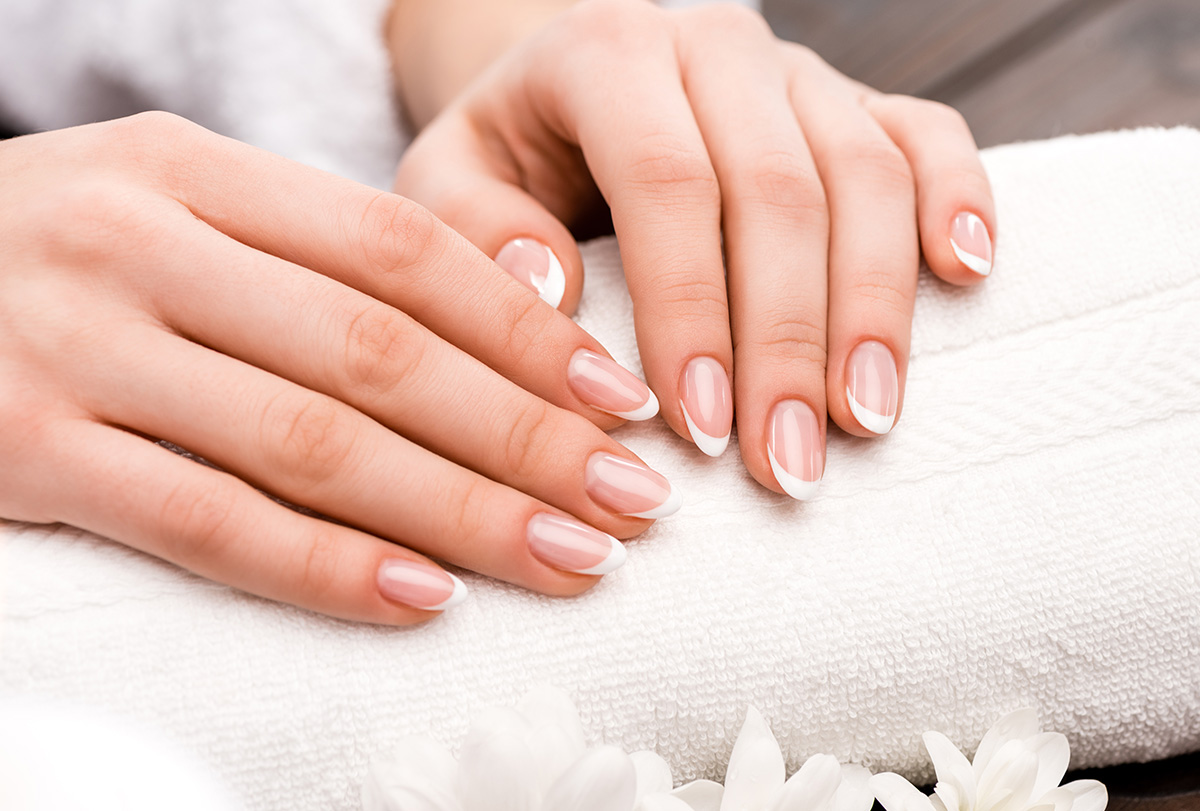
However, dryness, dullness, pits, dents, vertical ridges, discoloration, and weakness in the nails are common problems. Unhealthy nails break easily and it is difficult to grow them. Neglected nails also may turn yellow due to vitamin deficiencies or fungal infections. (1)
Poor nail strength is often a result of aging, as with time, the production of keratin slows down. Since keratin is a major protein in nails (also in hair and skin), a lack of it can make your nails weak, dry, and dull.
Weak nails may also result from medical conditions such as psoriasis, hypothyroidism, osteoporosis, and Raynaud’s syndrome. (2)(3)(4) In addition, nail care is often overlooked, which, when combined with constant exposure to extreme weather, chemicals, and excessive hand washing, can increase the problem of weak nails.
Here are the ways you can use to strengthen your nails and make them stronger:
1. Use cuticle serums for moisturization
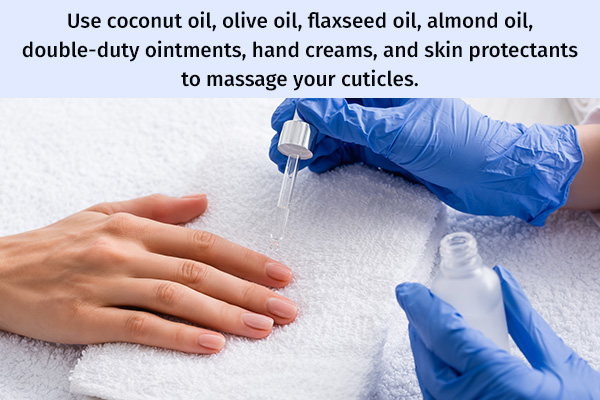
Healthy cuticles are the key to healthy, strong nails. However, it is quite common to damage your cuticles or push them too far, often increasing the risk of infection in the nail bed. (5) Your cuticles may also get damaged due to medical conditions that lower blood circulation to the extremities, such as diabetes.
To help strengthen your nail cuticles and boost blood flow to them, it is suggested to perform a quick massage. You can use coconut oil, olive oil, flaxseed oil, almond oil, double-duty ointments, hand creams, and skin protectants to massage your cuticles.
Invest in a cuticle oil that not only moisturizes the cuticles but also nourishes and repairs them, all of which contribute to improved cuticle health. You can purchase cuticle oils with a high content of shea oil.
Simply gently massage your nails with the product for 5–10 minutes. Wear cotton gloves once the product is absorbed and leave it on overnight. Wash your nails in the morning using warm water. Eczema-friendly creams are also available for people with eczema.
2. Improve your nails hygiene practices
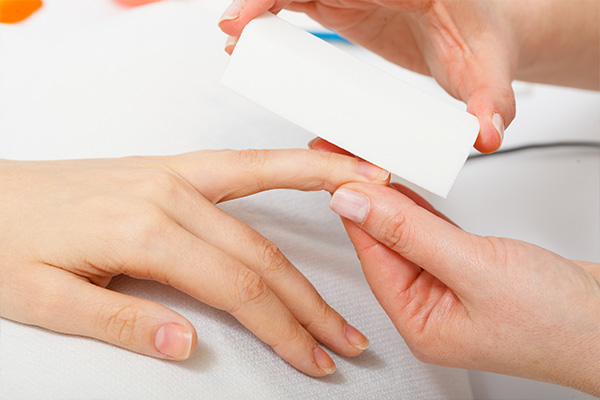
Nail hygiene is often overlooked, contributing to the problem of weak, brittle nails. Therefore, it is vital to pay attention to your nail hygiene and improve your nail care regimen.
The following tips may be useful for improving and maintaining the health of your nails:
- Trim your nails regularly to avoid breakage and jagging, which are associated with long nails. To lower the chances of breaking, cracking, or peeling your nails, it is suggested to keep them short and round-shaped. Depending on the rate of your nail growth, you may have to trim your nails weekly or biweekly.
- File your nails using a nail file with microfibers in long, swift, gentle strokes to even out any sharp edges that can increase the risk of hangnails, peeling of nails, and tears in the nails. In addition, buff the surface of your nails to smoothen ridges. You can also use a crystal file if you are prone to brittle nails.
- Scrub your nails gently using a nail brush. However, avoid vigorous cleaning or using other tools to steer clear of infections. Similarly, advise your manicurist against nail cleaning techniques that have posed nail problems for you in the past.
- Go to a registered nail technician for pedicures or manicures. While these treatments can be highly beneficial to your nails, going to unregistered, unhygienic places can do more harm than good. Therefore, make sure to seek the service of licensed technicians and ask them not to remove your cuticles. In addition, ensure that the foot baths are cleaned and the tools are properly sanitized before each use.
- Avoid the frequent use of using sanitizers as their alcohol content can cause your nails to turn dry and brittle. (6) It is best to use sanitary wipes instead of sanitizers to clean your hands.
3. Improve your diet to boost nail health
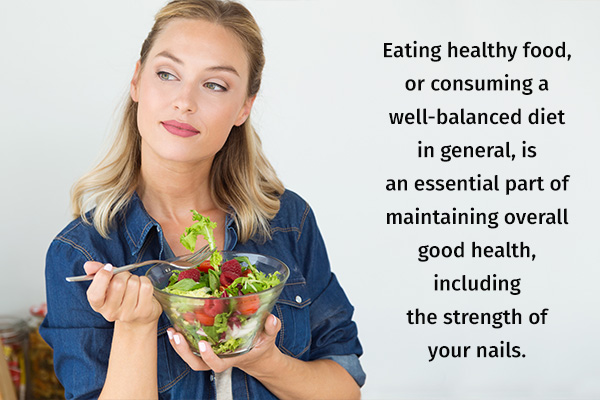
Eating healthy food, or consuming a well-balanced diet in general, is an essential part of maintaining overall good health, including the strength of your nails.
It is also good to know that certain food groups can boost nail health and prevent them from becoming weak and brittle. Modify your diet to include these healthy foods to help overcome and prevent the problem of weak nails.
Some nutrients essential to nail health are:
- Protein. Protein is an essential macronutrient that can greatly affect the growth of your nails, determining the speed at which the cells divide. Therefore, you must consume plenty of protein throughout the day. Try incorporating more protein-rich foods such as chicken, turkey, lean pork, eggs, fish, lentils, nuts, peanuts, and dairy products in your diet. Focus on the intake of collagen peptides, a form of protein that contributes to nail strength and improved health. In general, it is advised to consume 2.5–15 g of functional collagen peptides daily, although the recommended levels may vary according to the peptide type and desired benefit. (7)
- Iron. Iron is essential for the strength of your nails and can be obtained from lentils, white beans, lean meat, green leafy vegetables, fortified cereals, and potatoes. It is suggested to consume only up to 25 mg of elemental iron, as higher amounts can affect the body’s absorbing capability for zinc.
- Vitamin A. Vitamin A is essential for the health of your nails, bones, and teeth. This nutrient can be obtained from milk, spinach, grapefruit, liver, eggs, apples, and yams.
- Calcium. While calcium may not affect the strength of your nails directly, it has been shown that people with low calcium levels (associated with conditions such as osteoporosis) are highly prone to weaker nails. (8) Therefore, it is important to consume optimum levels of calcium daily.
- Other minerals. Aside from iron and calcium, minerals such as manganese, coppers, and zinc have been shown to contribute to nail health. These minerals can be obtained through the consumption of sunflower seeds and oats.
- Biotin. Foods such as sweet potatoes, salmon, leafy greens, avocados, nuts, and seeds are rich in biotin and boost collagen synthesis, helping improve the strength and health of your nails.
- Other food items. It is also suggested to consume freshwater fishes, mushrooms, wheat germ oil, sweet potatoes, tangerines, oysters, red bell peppers, and Brazil nuts to help improve the health of your nails.
- Water. In addition to improving your diet, it is essential to consume plenty of water, at least 8 glasses every day. This not only boosts the strength of your nails but also prevents dehydration and dryness that can weaken your nails. You can consume coconut water, tonic water, and citrus fruit juices as a part of your daily water intake as well.
4. Consider the use of supplements
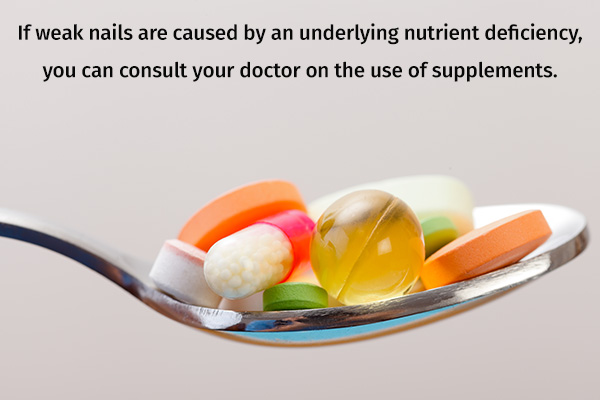
If weak nails are caused by an underlying nutrient deficiency, such as an iron deficiency, you can consult your doctor on the use of supplements. (9)
The following supplements are often suggested to improve nail health and can be taken upon consultation with a doctor:
- Vitamin B9. Also known as folic acid, vitamin B9 can be found in legumes and whole grains and is essential for cell repair and therefore in restoring nail health. Consumption of vitamin B9 supplements can help strengthen your nails and lower the chances of peeling or breakage.
- Keratin. As discussed above, keratin is a protein needed for nail strength. Therefore, the use of keratin supplements and even keratin oil can boost your nail health.
- Biotin. This water-soluble vitamin has been shown to boost nail strength. (10) It is suggested to consume about 30 µg of biotin every day, (11) and the requirement can be met with the help of supplements. Biotin supplements can improve nail health in 4–9 months of use.
5. Always apply base and top coats
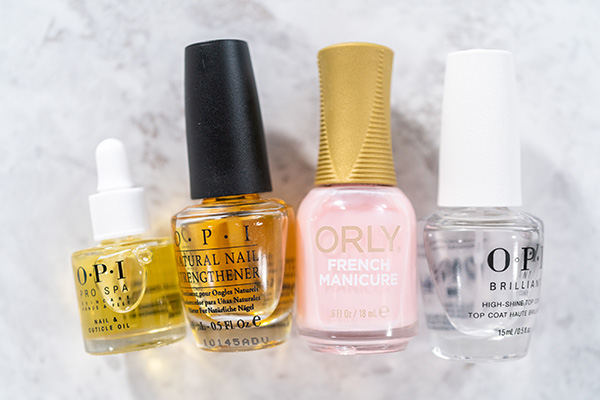
Base coats and top coats can help strengthen and protect your nails, especially if they are weak or brittle. Base coats help prevent your nail polish from damaging your nails. Moreover, they act as a barrier against breakage and dehydration.
6. Use nail hardeners periodically
You can also use nail lacquers known as nail strengtheners, nail hardeners, and fortifying nail builders to help restructure and strengthen your nails. (12) These strengthening varnishes contain jojoba oil, camellia oil, or kukui nut oil and form a hard, thick, shiny coat on your nails to help prevent nail damage.
You can also use serum strengtheners containing lactic acid, cationic hyaluronic acid, silicone, calcium, methylsulfonylmethane, bamboo extracts, wheat protein, saccharide isomerate, celery seed extract, and urea. These ingredients are absorbed by the nail, providing moisturization.
Also, the application of hydroxypropyl chitosan nail lacquer has been shown to improve nail structures and protect them from physical nail injuries. (12)
Avoid the use of nail hardeners that contain parabens and formaldehyde as they can harm your nails, often causing conditions such as chromonychia, onycholysis, hyperkeratosis, and subungual hemorrhage. (13)
In addition, make sure to use the OTC nail-strengthening hardeners for only a short time and sparingly. If you need nail hardeners for long-term use, consult your doctor for prescription solutions that moisturize the nails while strengthening them.
7. Choose your nail products wisely
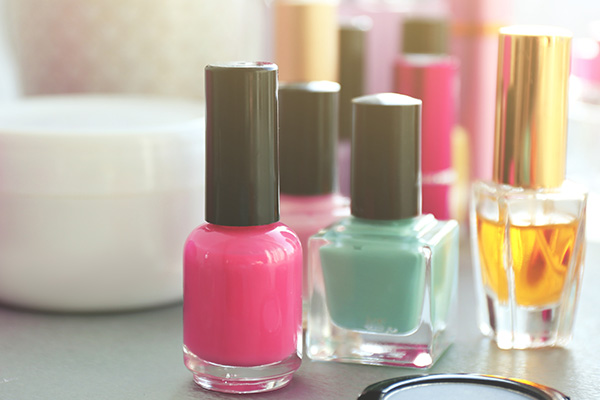
The use of different nail polishes to increase the appeal of your nails is a common practice. However, nail polishes that contain toxic chemicals must be avoided as they can weaken your nails and make them brittle. These chemicals include camphor, formaldehyde resin, TPHP, dibutyl phthalate, toluene, and xylene.
Moreover, the use of nail polishes is often coupled with the frequent use of nail polish removers such as acetone. These products can strip the natural oils from your nails, leading to weak and brittle nails. The chemical-laden nail polish removers can also dehydrate your nails and cause discoloration, keratin granulations, splitting, and peeling.
It is suggested to use alternate products such as acetone-free nail polish remover pads for this purpose. This also eliminates the risk of gamma-butyrolactone poisoning, which usually happens when children accidentally ingest acetone-based nail polish removers that contain this harmful compound. (14)
Another common nail beauty product to stay wary of is acrylic nails and acrylic gel manicures, especially from unlicensed salons. This artificial nail technique can increase the risk of nail and cuticle infections and conditions such as contact dermatitis. (15)
In addition, the UV light used for setting these nails involves a minute risk of developing skin cancer. (16) Always wear sunscreen if you are going to get artificial nails. Also, it is suggested to wear nail extension tips rather than acrylic nails since the former are less damaging as they cover a lower surface area.
8. Use gloves whenever needed
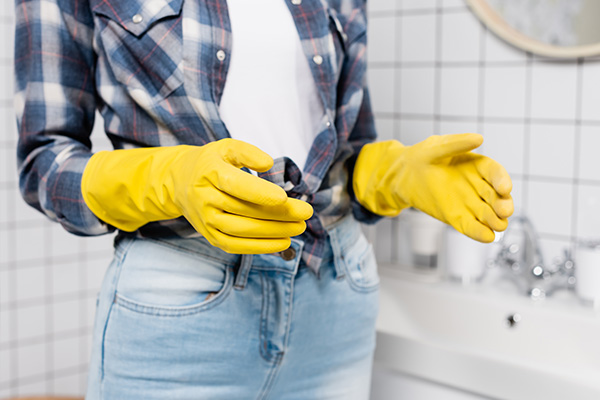
Excessive hand washing can be damaging to your nails as constant exposure to soapy or hot water can soften your nails, making them brittle and weak. In addition, constant contact with water can cause nail splitting, which may lead to a condition known as onychoschizia.
Similarly, nails exposed to the dry winter weather often become brittle. This happens especially when temperature fluctuations occur while moving indoors to outdoors or vice versa. Your nails expand and contract periodically according to the temperature they are in. These repetitive changes can weaken the cells, making the nails prone to breakage.
Therefore, wear gloves to protect your nails from water- or weather-caused damage. Use cotton-lined rubber gloves while working with water, such as during gardening, doing the dishes, or housecleaning. Wearing gloves also prevents dirt from getting into your nails, preventing infections.
Additionally, make sure to wipe your nails dry after swimming or showering to keep them dry and prevent bacterial growth.
9. Avoid biting your nails
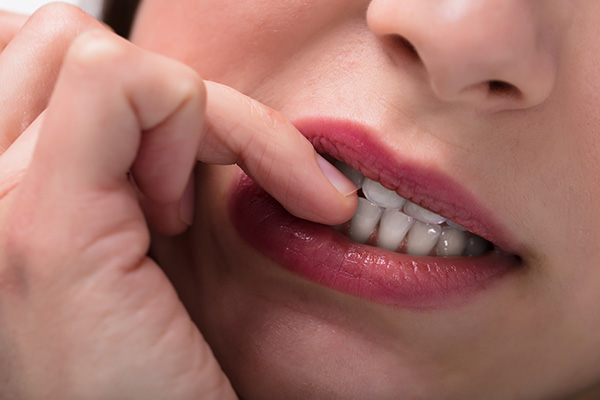
People often bite their nails out of boredom, nervousness, and various other reasons. While they may not realize the consequences of nail-biting immediately, years of this habit can damage the nails severely.
Repetitive nail-biting over a long period can shorten the nails, destroy the cuticles, and even damage the nail bed. In addition, it increases the chances of developing a bacterial or fungal infection.
Therefore, quit this habit at the earliest to preserve the health of your nails. Applying a bitter-tasting polish on your nails may help control the habit. Also, try to determine the physical or mental triggers that initiate this habit and work to improve the condition.
10. Try the following home remedies
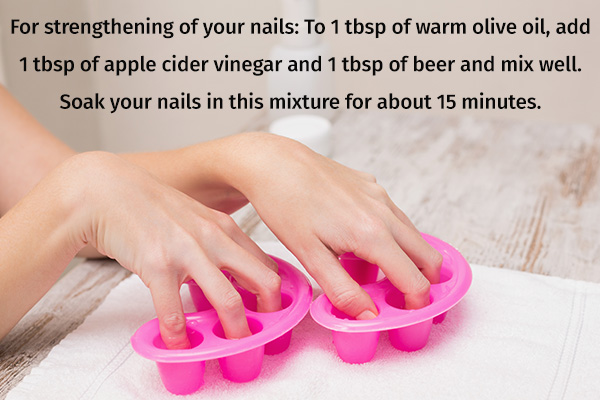
Various home remedies have been shown anecdotally to strengthen the nails. However, when trying these remedies, keep in mind that they are not backed by scientific evidence.
Since the remedies are generally safe, you can use them as an adjunct to other self-care measures and see if they work for you.
The following home remedies may aid in strengthening your nails:
- Mix one egg yolk with 2 tbsp of milk or cream, and apply the mixture to your nails. Wash it off after 10–15 minutes. This remedy can help nourish your nails and make them stronger.
- To 1 tbsp of warm olive oil, add 1 tbsp of apple cider vinegar and 1 tbsp of beer, and mix well. Soak your nails in this mixture for about 15 minutes.
- Dilute apple cider vinegar with equal amounts of water, and soak your nails in the solution for up to 10 minutes.
- Mix green tea, a few drops of wheat germ oil, and a pinch of salt. Soak your nails in the mixture for 5 minutes, and wipe them with a dry cloth.
- Add 1 tsp of lemon juice to 3 tsp of warm olive oil. Dab this solution on your nails using a cotton swab. Once the mixture is dry, cover your hands with soft, cotton gloves, preferably overnight.
When to See a Doctor
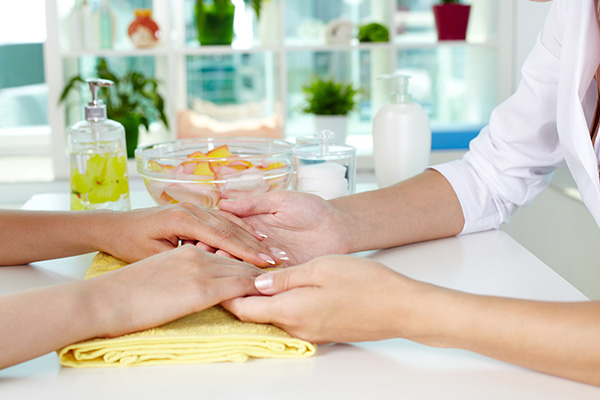
Nail health and strength can be improved with proper, constant care, but always consult a doctor if the problem persists as it may signify an underlying condition.
Consider consulting your doctor if you notice the following symptoms in your nails:
- Discoloration
- Dark streak under the nail
- Pink and white gradation of nails
- Yellowing
- Curling
- Thick or coarse texture
- Bleeding
- Inflammation
- Detachment from the surrounding skin
- Pain
- Redness
- Pus
Final Word
Strong, healthy nails represent good health and vitality, whereas weak or brittle nails can be symptomatic of an underlying deficiency, medical condition, or just poor hygiene. It is vital to take proper care of your nails so that you can strengthen and make nails stronger.
While your nails generally turn weak due to aging or the use of chemical-laden products, the damage generally can be reversed and prevented with self-care measures such as maintaining good nail hygiene, eating healthy food, avoiding abrasive products, and protecting them from damage.
However, if your nail health doesn’t improve despite trying proper self-care and the different remedies mentioned in the article, consult your doctor for a proper diagnosis and suitable treatment to strengthen your nails.
- Was this article helpful?
- YES, THANKS!NOT REALLY


